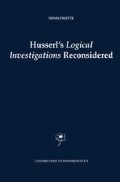Abstract
At the outset of the second volume of Husserl’s Logical Investigations it is pointed out, in agreement with John Stuart Mille2, that language is central to the concerns of logic (Hua XIX/1, p. 5). Among the linguistic expressions which concern Husserl in the subsequent investigations are names (Namen) and statements (Aussagen), as indeed Book I of Mill’s System of Logic was concerned with names and propositions1. In this regard Husserl and Mill follow a long-standing tradition, in which names and statements are indeed among the elements of logic, to be followed only by inferences. Nonetheless, the topic of names and statements, or any other class of linguistic expressions for that matter, is not Husserl’s ultimate concern in the second volume of the Logical Investigations. This volume, entitled “Investigations in the Phenomenology and Theory of Cognition”2, culminates in the fifth and six “Logical Investigations”, which are respectively entitled “On Intentional Lived-Through Processes and their ‘Contents”’3 and “Elements of a Phenomenological Elucidation of Cognition”4. In both of these cases Husserl is concerned with intentional lived-through processes which are intentionally directed. This concern with such processes (with acts, as Husserl often says) is of course explicit in the title of the fifth “Logical Investigation”. The term “cognition”, as found in the sixth one, by and large designates those acts in which something is evident5. In the following I shall critically examine Husserl’s views in the Logical Investigations on names and statements with particular attention to his observations concerning the corresponding acts of consciousness. As it has been seen elsewhere6, Husserl’s belonging to the school of Brentano will prove to be of great relevance here.
In the following the Logical Investigations will be referred in italics when the work as a whole is meant, whereas each of the six investigations in the second volume will be referred to as a “Logical Investigation” (in quotation marks). References to passages from the work will be made in parentheses in the text. The Husserliana edition will be used and thus indicated by “Hua” followed by a Roman numeral to indicate the relevant volume. When the English translation of J. N. Findlay (London: Routledge & Kegan Paul, 1970) is used (albeit often with considerable revisions), this will be indicated as “Findlay” followed by a Roman numeral to indicate the relevant volume of the translation. For the most part, the text of the first edition of the Logical Investigations will be preferred over that of the second one.
Access this chapter
Tax calculation will be finalised at checkout
Purchases are for personal use only
Preview
Unable to display preview. Download preview PDF.
References
See Mill, A System of Logic, Ratiocinative and Inductive: Being a Connected View of the Principle of Evidence and the Methods of Scientific Investigation, 81h ed. (New York: Harper & Brothers, 1874), Bk. I, Ch. I, § 1. In Husserl’s library (Husserl Archives, Leuven) there is a copy of the authorized (also annotated) German translatation of this work: Theodor Gomperz (translator), System der deductiven and inductiven Logik. Eine Darlegung der Grundsätze der Beweislehre and der Methoden wissenschaftlicher Forschung (Fue’s Verlag (R. Reisland): Leipzig, 1872. The copy bears extensive markings and annotations by Husserl.
The term “proposition” is used by Mill to designate statements, i.e., particular linguistic expressions. The term “proposition” in this paper, however, will be used as a translation of Satz,which is used by Husserl in application to certain ideal objects which need not be expressed in language or even “thought” in the mind.
Findlay’s two-volume translation of the Logical Investigations,which has many points in its favor compared to other translations of Husserl’s writings, unfortunately does not contain this title in the table of contents or in the text.
The term Erlebnisse is translated as “lived-through processes”, whereas Findlay translates it as “experiences”. Though a perfect English translation of this term, let alone one that fits all its usages, is perhaps impossible, it is very important to avoid any confusion at all between Erlebnis and Erfahrung,the latter of which absolutely must be translated as “experienced”.
The term Erkenntnis,which is here translated as “cognition”, is translated by Findlay as “knowledge”. Though his translation of this term is suitable for much ordinary and philosophical usage, it is better to translate it here as “cognition”, which is more appropriate for designating a class of acts than the term “knowledge” would be. It is after all quite acceptable to speak of someone having knowledge even when the person is asleep. That is to say, knowledge is a disposition rather than an act. Cognition, however, occurs only insofar as something is actually being cognized.
Though the term Erkenntnis normally refers only to higher intellectual acts, Husserl often uses it in references to lower acts, e. g., perception, in which something is evident.
Robin D. Rollinger, 1999. See also Robin D. Rollinger, 1993.
Though the term Bedeutung is nowadays often taken to mean “reference”, Husserl points out plainly that he uses it as a synonym of Sinn (Hua XIX/1, p. 58).
The only case in which Husserl finds it acceptable to say that an expression is not a sign he finds in solitary speech (Hua XIX/1, pp. 41 ff.).
Author information
Authors and Affiliations
Rights and permissions
Copyright information
© 2003 Springer Science+Business Media Dordrecht
About this chapter
Cite this chapter
Rollinger, R.D. (2003). Names, Statements, and Their Corresponding Acts in Husserl’s Logical Investigations . In: Husserl’s Logical Investigations Reconsidered. Contributions to Phenomenology, vol 48. Springer, Dordrecht. https://doi.org/10.1007/978-94-017-0207-2_9
Download citation
DOI: https://doi.org/10.1007/978-94-017-0207-2_9
Publisher Name: Springer, Dordrecht
Print ISBN: 978-90-481-6324-3
Online ISBN: 978-94-017-0207-2
eBook Packages: Springer Book Archive

